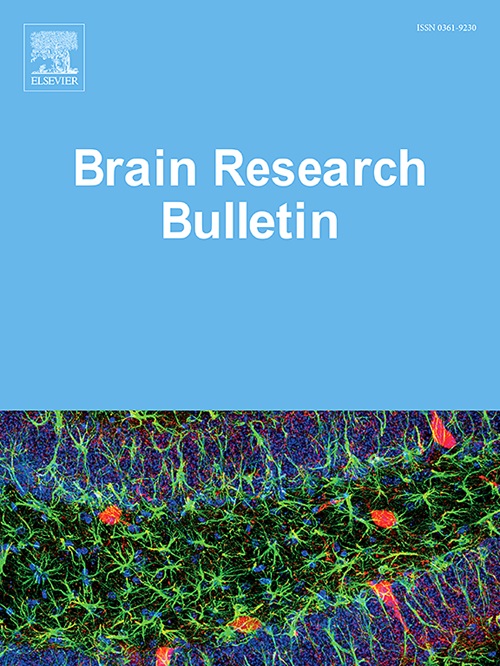电针和通便汤通过肠脑轴TPH2/5-HT通路改善cms所致小鼠抑郁和便秘。
IF 3.5
3区 医学
Q2 NEUROSCIENCES
引用次数: 0
摘要
抑郁症通常与胃肠道(GI)疾病有关,如便秘,这可能会加剧抑郁症状。这些条件之间的相互作用被认为是由肠-脑轴促进的,这表明了一种复杂的双向相互作用。目前的治疗方法,如抗抑郁药和促生药,往往与副作用和高复发率有关,这突出了针对抑郁症和便秘的有效治疗的必要性。本研究旨在评估电针(EA)联合通便汤(TB)治疗抑郁症和便秘的疗效,并通过肠脑轴的视角探讨其潜在机制。采用慢性不可预测轻度应激(CUMS)诱导小鼠抑郁和便秘共病模型,随后给予EA、EA + TB和氟西汀(FLX)。研究结果表明,电针联合通便汤的抗抑郁作用明显优于电针单用。EA + 结核病治疗显著改善了慢性不可预测轻度应激(CUMS)小鼠的抑郁和焦虑样行为,恢复了认知功能,并增强了胃肠道运动。此外,EA + TB减少了肠道炎症,恢复了神经元形态,增加了前额叶皮层(PFC)和结肠中色氨酸羟化酶2 (TPH2)的表达,提高了血清5-羟色氨酸(5-HTP)的水平,这是一种作为肠-脑连接物的分子,促进了胃肠道和大脑中5-羟色胺(5-HT)的合成和产生。相比之下,FLX在改善便秘方面的效果有限。综上所述,EA + TB通过肠脑轴调控TPH2/5-HT通路,表现出对神经和胃肠道系统的协同调节,具有良好的抗抑郁和促动力作用。本文章由计算机程序翻译,如有差异,请以英文原文为准。
Electroacupuncture and Tongbian decoction ameliorate CUMS-induced depression and constipation in mice via TPH2/5-HT pathway of the gut-brain axis
Depression is commonly associated with gastrointestinal (GI) disorders, such as constipation, which can potentially intensify depressive symptoms. The interplay between these conditions is believed to be facilitated by the gut-brain axis, which suggests a complex bidirectional interaction. Current treatments, such as antidepressants and prokinetics, are often associated with side effects and high recurrence rates, highlighting the need for effective treatments targeting both depression and constipation. This study was designed to assess the therapeutic efficacy of electroacupuncture (EA) in conjunction with Tongbian decoction (TB) for the management of both depression and constipation, while also investigating the underlying mechanisms through the lens of the gut-brain axis. Chronic unpredictable mild stress (CUMS) was employed to induce a comorbidity model of depression and constipation in mice, followed by the administration of EA, EA + TB, and fluoxetine (FLX). The findings of the study demonstrated that the antidepressant effects of electroacupuncture (EA) in combination with Tongbian decoction (TB) were more pronounced than those of EA alone. The EA + TB treatment significantly ameliorated depression and anxiety-like behaviors, restored cognitive function, and enhanced gastrointestinal motility in chronic unpredictable mild stress (CUMS) mice. Furthermore, EA + TB reduced intestinal inflammation, restored neuronal morphology, increased the expression of tryptophan hydroxylase 2 (TPH2) in both the prefrontal cortex (PFC) and colon, elevated the serum levels of 5-hydroxytryptophan (5-HTP)—a molecule that acts as a gut-brain connector—and promoted the synthesis and production of serotonin (5-HT) in both the gastrointestinal tract and the brain. Contrastingly, FLX showed limited efficacy in improving constipation. In conclusion, EA + TB regulates the TPH2/5-HT pathway via the gut-brain axis, demonstrating synergistic regulation of the nervous and gastrointestinal systems, with favorable antidepressant and prokinetic effects.
求助全文
通过发布文献求助,成功后即可免费获取论文全文。
去求助
来源期刊

Brain Research Bulletin
医学-神经科学
CiteScore
6.90
自引率
2.60%
发文量
253
审稿时长
67 days
期刊介绍:
The Brain Research Bulletin (BRB) aims to publish novel work that advances our knowledge of molecular and cellular mechanisms that underlie neural network properties associated with behavior, cognition and other brain functions during neurodevelopment and in the adult. Although clinical research is out of the Journal''s scope, the BRB also aims to publish translation research that provides insight into biological mechanisms and processes associated with neurodegeneration mechanisms, neurological diseases and neuropsychiatric disorders. The Journal is especially interested in research using novel methodologies, such as optogenetics, multielectrode array recordings and life imaging in wild-type and genetically-modified animal models, with the goal to advance our understanding of how neurons, glia and networks function in vivo.
 求助内容:
求助内容: 应助结果提醒方式:
应助结果提醒方式:


